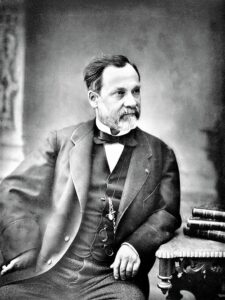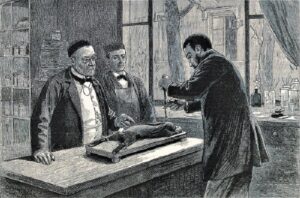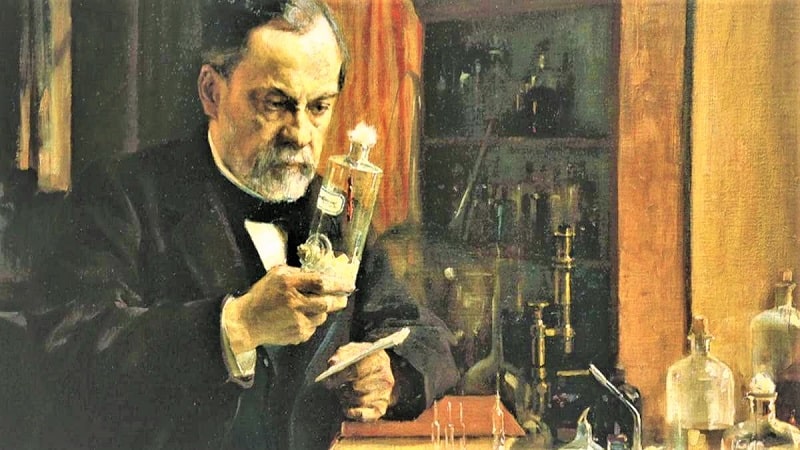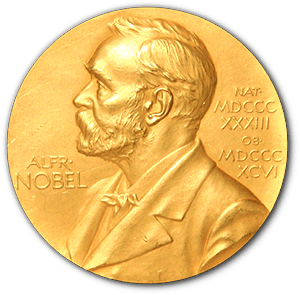Louis Pasteur (Born on December 27, 1822, in Dole, Jura, France – Died on September 28, 1895, in Marnes-la-Coquette, France) was a French biologist, microbiologist, physicist, and chemist whose discoveries had enormous importance in the history of chemistry and medicine.
He is recognized for his remarkable discoveries of the causes and prevention of diseases. Among his most notable achievements can mention the reduction of mortality and the creation of the first vaccine against rabies (rabies vaccine).
Their experiments provided a basis for the microbiological theory of the disease. He was best known to the general public for inventing a method to prevent milk and wine from causing disease, a process that came to be called pasteurization, in honor of his surname.
Pasteur is considered to be one of the three main founders of microbiology, along with Ferdinand Cohn and Robert Koch. He also made many discoveries in the field of chemistry, mainly the molecular basis for the asymmetry of certain crystals.
He was the founder and director of the institute named after the Luis Pasteur Institute established in 1887, a private French non-profit foundation dedicated to the study of biology, microorganisms, diseases, and vaccines.

Quick Facts of Louis Pasteur
- Born: December 27, 1822, Dole, Jura, France
- Died: September 28, 1895 (aged 72) Marnes-la-Coquette, France
- Known for: Created the first vaccines for rabies:-
(Cholera vaccine)
(Anthrax vaccines)
(Pasteurization) - Awards:
Legion of Honor Grand Cross (1881)
Rumford Medal (1856)
Foreign Member of the Royal Society (1869)[2]
Copley Medal (1874)
Albert Medal (1882)
Foreign Associate of the National Academy of Sciences (1883)
Cameron Prize for Therapeutics of the University of Edinburgh (1889)
Leeuwenhoek Medal (1895)
Order of the Medjidie - Fields:
Biology
Microbiology
Chemistry - Institutions:
University of Strasbourg
University of Lille
École Normale Supérieure
Pasteur Institute - Nationality: French
- Spouse: Marie Pasteur
- Children: Marie-Louise Pasteur
- Parents: Father – Jean-Joseph Pasteur, Mother – Jeanne-Etiennette Roqui
- Religion: Catholic Christianity
- Quotes: Science knows no country, because knowledge belongs to humanity, and is the torch which illuminates the world. – Louis Pasteur
Early Life of Louis Pasteur
Louis Pasteur was born at two in the morning on December 27, 1822, in the family home of Dole, the third child of Jean-Joseph Pasteur and Jeanne-Étiennette Roqui. He was baptized in the Collegiate Church of Notre-Dame de Dole on January 15, 1823.
His father, after having been a sergeant in the Napoleonic army, resumed the family profession of tanner. In 1827, the family left Dole for Marnoz, the place of the Roqui 3 family house, to finally move to a new house in 1830 in Arbois, a locality more conducive to tanning activity.
The young Pastor follows mutual education courses in Arbois then enters the town college. It was at this time that he became known for his talents as a painter; he also made numerous portraits of members of his family and the inhabitants of the small town.
Education
Louis Pasteur went to the royal high school in Besançon. Then in October 1838, he left for the Institution Barbet, in Paris, in order to prepare for the baccalaureate and then for the competitive examinations. However, depressed by this new life, he gave up his project, left Paris, and finished his school year 1838-1839 at the college of Arbois.
At the start of the 1839 school year, he returned to the Royal College of Franche-Comté, in Besançon. In 1840, he obtained the baccalaureate in letters and then, in 1842, after a failure, the baccalaureate in mathematical sciences.
Louis Pasteur returns to Paris in November. Housed at the Barbet pension, where he also acts as a tutor, he follows courses at the Lycée Saint-Louis and enthusiastically attends those given at the Sorbonne by the chemist Jean-Baptiste Dumas; he was also able to take some lessons with Claude Pouillet.
In 1843, he was finally admitted – fourth – to the Normal School. Later he will be a student of Jean-Baptiste Boussingault at the National Conservatory of Arts and Crafts.
Developing Rabies Vaccine

Louis Pasteur developed a virus vaccine against rabies disease. He managed to make a dog immune, and he treated horses. On July 6, 1885, nine-year-old Joseph Meister from Alsace, who had been bitten by a mad dog, was brought to Pasteur.
Pasteur began the treatment with the help of inoculations developed by him, which was personally risky for him, as he was not a licensed physician. After weeks of treatment of the young patient, who was flushed with fever, the boy healed and Pasteur could rightly say that he had overcome rabies.


